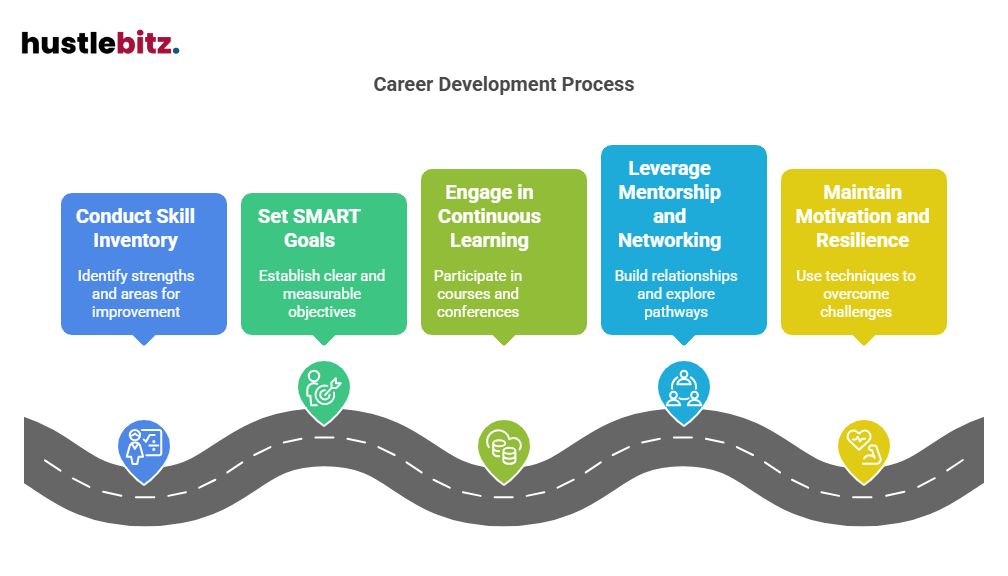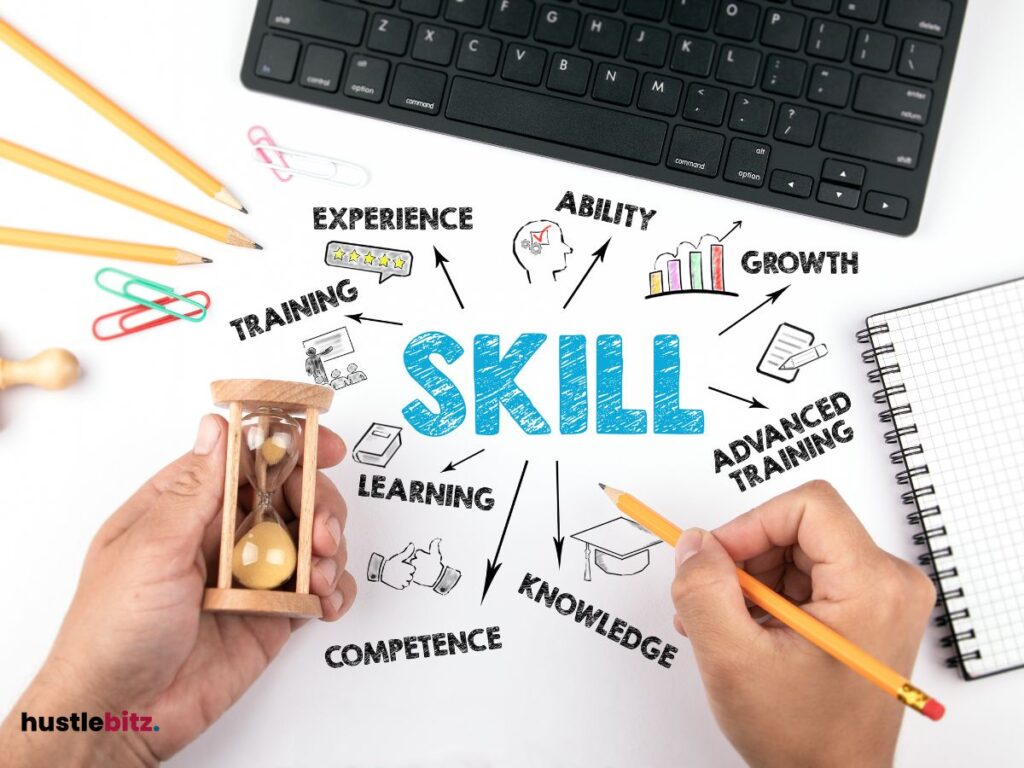Building a solid career development plan is critical for long-term success. Start by assessing your skills and identifying areas for improvement. Set clear, SMART goals that guide your progression and track milestones along the way. Embrace mentorship and networking opportunities to enhance your visibility and gather valuable insights. Stay informed about industry trends and invest in continuous learning through certifications and workshops. Cultivating emotional intelligence and resilience is equally important, as they enhance interpersonal relationships and adaptability. By following these strategies, you can create a robust framework for your career trajectory that leads to enduring fulfillment and opportunities. More insights await you on this journey.
Key Takeaways
- Conduct a skill inventory to identify strengths and areas for improvement, aligning them with career aspirations for targeted growth.
- Set SMART goals to provide clear direction and measurable milestones for tracking progress in your career development journey.
- Engage in continuous learning through online courses, professional certifications, and industry conferences to stay relevant and enhance your skill set.
- Leverage mentorship and networking opportunities to gain insights, build relationships, and explore diverse career pathways.
- Maintain motivation and resilience through stress management techniques, work-life balance, and a growth mindset to overcome challenges.

Understanding Career Development
Career development encompasses a strategic approach to enhancing an individual’s skills, knowledge, and experiences to achieve professional growth and advancement. This journey is multifaceted, integrating various elements that contribute to an individual’s success in the workplace.
One significant aspect is the cultivation of emotional intelligence, which enables professionals to navigate interpersonal relationships effectively, fostering collaboration and team cohesion.
Mentorship benefits play a crucial role in career development, as experienced professionals can provide guidance, support, and insights that facilitate career growth. Leveraging networking strategies, such as industry networking events and online platforms, enhances one’s visibility and connections, opening doors to new opportunities. Additionally, personal branding is essential in distinguishing oneself in a competitive job market, allowing individuals to communicate their unique value propositions effectively.
Skill enhancement is pivotal in maintaining relevance in today’s rapidly changing professional landscape. Pursuing professional certifications not only demonstrates a commitment to continuous learning but also signifies expertise in specific areas. Furthermore, performance feedback is instrumental in identifying strengths and areas for improvement, fostering a growth mindset.
Striking a healthy work-life balance is essential for sustained career development, as it prevents burnout and promotes overall well-being. By integrating these elements into a cohesive career development plan, individuals can strategically position themselves for success, ensuring they are prepared for both current challenges and future opportunities in their professional journey.
Assessing Your Current Skills

Evaluating your current skills is essential to identify strengths and areas for improvement, enabling targeted development efforts that align with your career aspirations. A thorough assessment can significantly enhance your personal branding and ensure your professional competencies are well-aligned with industry demands.
Here are three effective methods to assess your skills:
- Skill Inventory: Create a comprehensive inventory of your skills, including hard and soft skills. This inventory should encompass your transferable skills that can be applied across various roles and industries.
- Self-Assessment Tools: Utilize self-assessment tools to gain insights into your capabilities. These tools often provide structured frameworks for strengths analysis and weaknesses identification, helping to pinpoint areas for skill enhancement.
- Performance Feedback and Peer Evaluations: Seek performance feedback from supervisors and consider peer evaluations. Constructive criticism can provide invaluable perspectives on your professional competencies and areas requiring improvement.
Setting Clear Goals
Establishing clear and achievable goals is crucial for guiding your professional development and aligning your efforts with long-term aspirations. The process begins with defining SMART objectives—specific, measurable, achievable, relevant, and time-bound—that provide a structured framework for your ambitions. These objectives help ensure goal alignment with your long-term vision and personal values, creating a cohesive path towards success.
To maintain momentum, it is essential to break down your long-term vision into short-term milestones. These milestones act as stepping stones, allowing you to track progress and celebrate small victories along the way. Incorporating performance metrics and success indicators enables you to evaluate your achievements objectively, ensuring that your efforts are producing the desired outcomes.
Additionally, establishing feedback loops is vital for continuous improvement. Regularly soliciting feedback from peers and mentors helps you refine your approach and stay accountable to your goals. Engaging with accountability partners can further enhance your commitment, as they provide support and motivation throughout your journey.
Utilizing motivation techniques, such as visualization or positive affirmations, can also bolster your resolve as you work towards your objectives. By consistently monitoring your progress and adjusting your strategies as necessary, you can navigate challenges effectively and remain focused on your aspirations.
Ultimately, setting clear goals not only directs your career development but also fosters a sense of purpose and achievement, paving the way to long-term success.
Identifying Career Pathways

Exploring various career pathways is essential for individuals seeking to align their skills and interests with professional opportunities that offer growth and fulfillment. Identifying the right career pathway involves a combination of self-assessment, research, and strategic planning. Engaging in career mapping can help individuals visualize their potential trajectories and pinpoint areas where skill gaps may exist.
To effectively identify and pursue career pathways, consider the following strategies:
- Participate in Mentorship Programs: Building relationships with experienced professionals can provide valuable insights and guidance as you navigate your career options.
- Engage in Job Shadowing: Observing professionals in your desired field allows you to gain firsthand experience and clarify your career aspirations.
- Complete Career Assessments: These tools can help you uncover your strengths and interests, aligning them with potential career pathways.
Moreover, enhancing your personal branding through professional certifications and passion projects can set you apart in a competitive job market.
Networking strategies, such as attending industry events and connecting with peers, can also open doors to new opportunities and facilitate industry transitions.
Researching Industry Trends

Understanding industry trends is crucial for professionals aiming to align their skills and career goals with the evolving demands of the job market. In today’s rapidly changing landscape, staying informed about emerging technologies and industry innovations is essential for maintaining relevance. As market demands shift, professionals must adapt to remain competitive. This involves not only understanding the competitive landscape but also identifying potential skill gaps that may arise as new roles and responsibilities emerge.
Economic forecasts can provide valuable insights into anticipated workforce shifts, helping professionals to strategize their career moves effectively. This foresight allows individuals to prepare for changes in the job market, ensuring they possess the necessary skills and knowledge to thrive. Additionally, regulatory changes can significantly impact industry practices; staying abreast of these developments can inform strategic career decisions.
Implementing effective networking strategies is another key component of researching industry trends. Engaging with peers and industry leaders can yield insights into best practices and emerging opportunities, enhancing one’s understanding of the current market environment. By actively participating in professional networks, individuals can gather information about the evolving job market and the competencies that are increasingly sought after.
Ultimately, a thorough understanding of industry trends empowers professionals to proactively shape their career trajectories. By aligning their skill sets with market demands, they position themselves for long-term success, paving the way for growth and advancement in their chosen fields.
Continuous Learning Opportunities

As industry trends evolve, professionals must actively seek continuous learning opportunities to enhance their skill sets and remain competitive in a dynamic job market. Engaging in a variety of learning avenues not only equips individuals with essential skills but also fosters personal and professional growth.
Here are three key continuous learning opportunities to consider:
- Online Courses: With platforms offering a vast array of subjects, professionals can pursue online courses to gain new knowledge at their own pace. This self-directed learning approach allows for flexibility in balancing work and education.
- Mentorship Programs: Connecting with industry veterans through mentorship programs provides invaluable insights and guidance. These relationships can facilitate knowledge sharing and offer constructive peer feedback, enhancing career development.
- Skill Workshops and Professional Conferences: Participating in skill workshops and attending professional conferences not only deepens expertise but also expands networking opportunities. These events provide a unique platform for fostering relationships that can lead to future collaborations.
In addition to these avenues, obtaining industry certifications and engaging in personal projects can further solidify one’s qualifications. Moreover, actively participating in networking events enhances visibility and opens doors to new opportunities.
Ultimately, embracing a culture of continuous learning is essential for adapting to the ever-changing landscape of today’s professions, ensuring long-term success.
Staying Motivated and Resilient

Maintaining motivation and resilience is crucial for professionals navigating the challenges of career development and personal growth. As individuals pursue their objectives, they often encounter obstacles that can lead to frustration and self-doubt. Implementing effective motivation techniques, such as goal visualization and positive affirmations, can significantly enhance one’s drive and focus. By vividly imagining the successful outcomes of their efforts, professionals can foster a sense of purpose that propels them forward.
Resilience building is equally essential, particularly when overcoming setbacks. Mindset shifts—transforming negative thoughts into constructive ones—can empower individuals to view challenges as opportunities for growth. Engaging with accountability partners can provide necessary support, encouraging individuals to stay committed to their goals and maintain self-discipline strategies.
Moreover, effective stress management is vital in sustaining motivation. Practices such as mindfulness and relaxation techniques can help mitigate the pressure that often accompanies career development. By prioritizing work-life balance, professionals can ensure they have the energy and mental clarity needed to tackle their ambitions without succumbing to burnout.
Final Thoughts
Building a solid career development plan is essential for achieving long-term success and fulfillment in your professional life. By thoroughly assessing your skills, setting clear and achievable goals, and actively engaging in continuous learning, you lay a strong foundation for growth. Embracing mentorship and networking opportunities not only enhances your visibility but also provides valuable insights into your industry. Staying informed about industry trends and maintaining resilience in the face of challenges further positions you for success. Remember, career development is an ongoing journey that requires adaptability and commitment. With a strategic approach and a proactive mindset, you can effectively navigate your career path and achieve your long-term aspirations.




